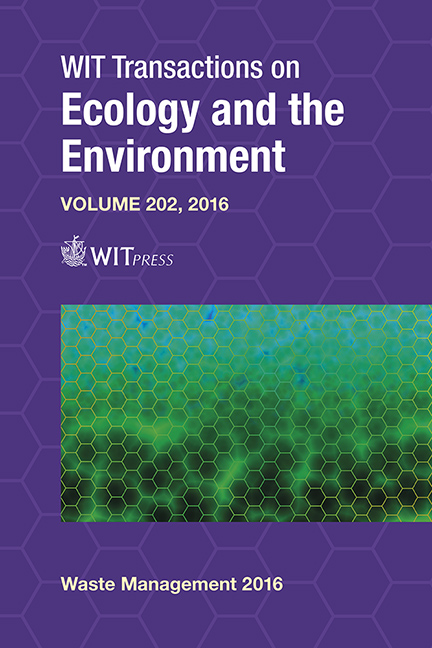Sustainable Waste Management: The Example Of The Informal Settlement “Las Fincas” On Cozumel Island, Mexico
Price
Free (open access)
Transaction
Volume
202
Pages
8
Page Range
187 - 194
Published
2016
Size
1,090 kb
Paper DOI
10.2495/WM160171
Copyright
WIT Press
Author(s)
T. L. Steenbeck, O. Frausto Martinez, M. Schirmer, C. Koch, S. Giese
Abstract
The study is part of the long-term research project called “Indicadores de productos de Interés Sustentabilidad aplicados a regional – México-Argentina” in collaboration with the University of Quintana Roo and the University Litoral of Argentina.
The project deals with the question: “How can you create sustainable waste management for an informal settlement to improve the social and environmental problems?” The knowledge gained from the last survey in 2014/2015 indicates that there is no systematic waste management within the settlement where 1015 people currently live. An unknown part of the waste is collected and disposed of in a disposal site by the waste management company PASA (Promotora Ambiental, S.A.B. de C.V.). The other part is burnt either on private property or improperly disposed illegally outside the land by residents. This leads to social tension between residents and to environmental pollution, such as, soil and groundwater pollution.
So far there are no data of waste and recycling management of the informal settlement Las Fincas. The study attempts to investigate the situation, to find out how the waste on the island is treated and how the municipal waste of Las Fincas is composed. The total amount of waste and its composition is analyzed by means of a waste analysis. Later a disposal plan for the settlement will be developed.
The basis for the analysis of waste are the corresponding sorting work guidelines and the household waste analysis data sheets of the Thuringian State Institute for Environment and Geology. The amount of waste of selected families is collected and analyzed in two consecutive samples. The average amount of waste per inhabitant per year is determined by the earnings projection. The results obtained are used on the one hand for the development of a sustainable waste management concept and on the other, for the economic analysis in the case of recyclable materials. In addition, the aspects of waste prevention and recycling, the use of bio-waste were considered as well.
Keywords
waste analysis, sustainable waste management, informal settlement, waste concept, environmentally influencing, bio-waste composting





